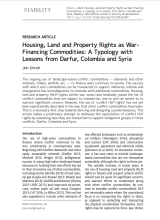Land Library Search
Through our robust search engine, you can search for any item of the over 73,000 highly curated resources in the Land Library.
If you would like to find an overview of what is possible, feel free to peruse the Search Guide.
/ library resources
Showing items 1 through 9 of 10.The ongoing use of landscape-based conflict commodities — diamonds and other minerals, timber, wildlife, etc. — to finance wars continues to evolve.
The impending close to the war in Syria brings to the fore the prospect of approximately 13 million forcibly displaced people considering returns to places of origin in the country.
In many cities and urban areas in Africa, land acquisition for urban redevelopment, land readjustment, and resettlement of affected urban residents are currently framed as innovative approaches to eradicating informal settlements, improving the living environments, and supporting the implementati
In recent years conflicts of land expropriation in China have received a lot of concern. Recent systematic reviews highlight causes, types and resolution of land conflicts, yet very few of these studies have considered the spatial-temporal characteristics of the issue.
In March 2018, The South African Cities Network (SACN) hosted its second Urban Land Dialogues Series in the provinces of Gauteng, Eastern Cape and Western Cape. The dialogues took place during a week when land was receiving widespread attention, as all eyes were on the Gordon Institute of Bu
In Nigeria, the recurring impoverishment and other negative socioeconomic impacts endured by landholders affected by expropriation are well-documented and call into question the Land Use Act's (LUA) effectiveness in protecting local land rights.
For a long time sub-Saharan Africa has been considered to have abundant and underutilized land than any other continent. On the contrary, recent studies show that many rural Africans live in increasingly densely populated areas where all arable land is allocated or under cultivation.
Land degradation has been a major political issue in Java for decades. Its causes have generally been framed by narratives focussing on farmers’ unsustainable cultivation practices. This paper causally links land degradation with struggles over natural resources in Central Java.







